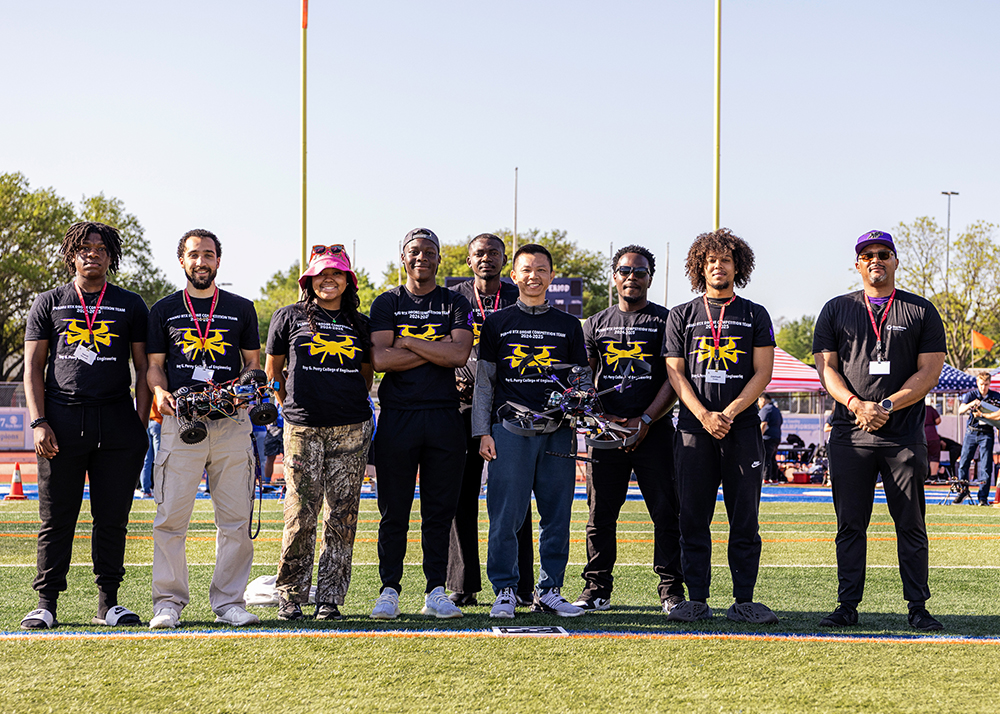PRAIRIE VIEW, Texas (May 30, 2025) – The Prairie View A&M University Drone Competition Team has soared to new heights, placing fourth in the 2025 Raytheon Autonomous Vehicle Challenge — a national competition that brought together top engineering students from across the country.

From left to right: Isaiah Maxwell, Jacob Range, London Williams, David Falekulo, Dr. Daniel Doe, Khoa Tran, Fawaz Abdulwahab, Jyeshuah Swain, Jonathan Tamplin
The challenge, hosted by Raytheon (a major U.S. defense contractor), asked student teams to build and operate autonomous (self-driving) drones capable of identifying and communicating a landing zone to an autonomous vehicle tasked with delivering a package.
PVAMU competed against nine other institutions during the final event, held on April 11. This was the University’s second time participating in the competition and the first time for every student on this year’s team.
“This accomplishment reflects the caliber of our students, the strength of our academic programs, and the value of hands-on, experiential learning,” said Dr. Pamela Obiomon, dean of the Roy G. Perry College of Engineering. “Their success is a win for all of PVAMU and a shining example of our mission in action.”
Built from Scratch, Powered by Teamwork
Led by senior mechanical engineering student Jacob Range, the team included students across multiple engineering disciplines:
- Khoa Tran, Junior, Electrical Engineering
- Fawaz Abdulwahab, Junior, Computer Engineering
- London Williams, Junior, Mechanical Engineering
- Jyeshuah Swain, Freshman, Computer Engineering
- David Falekulo, Freshman, Computer Science
- Isaiah Maxwell, Sophomore, Mechanical Engineering
The students spent months preparing for the competition, which simulated delivering aid to injured soldiers in the field. Teams were tasked with designing a drone that could autonomously survey a 30×30 yard area, locate a visual marker indicating a landing zone, and communicate coordinates to a separate autonomous ground vehicle for package delivery.
“We spent countless late nights troubleshooting and refining every detail,” said team member and junior electrical engineering major Khoa Tran. “It paid off in the end — we’re proud of what we accomplished and excited for what’s to come.”
First-Time Competitors, Big Results
The team credits its success to teamwork, mentorship, and persistence, especially when faced with technical setbacks during the event. “There were moments when things didn’t look promising, but the team pushed through,” said Jonathan Tamplin, a senior principal systems engineer at Raytheon who mentored the students throughout the semester. “Their incredible perseverance and determination shone through.”
Tamplin, along with PVAMU faculty mentors Dr. Daniel Doe and Dr. Charles Keese, supported the team’s journey from concept to competition day. Raytheon also provided technical guidance and created a space for students to apply their classroom knowledge in real-world scenarios.
Engineering the Future
For Range, the competition offered more than hands-on experience with autonomous technology — it became a proving ground for leadership and innovation. “I learned so much about project management and team coordination,” he said. “I am also excited about the possibility of this technology being used in the future to expand outside of just military use but also being used during events such as natural disasters to be able to deliver aid to those that would not be able to be reached otherwise.”
The PVAMU team is already looking ahead to next year’s challenge with hopes of growing their team, placing in the top three, and continuing to turn classroom knowledge into real-world innovation.
-PVAMU-



